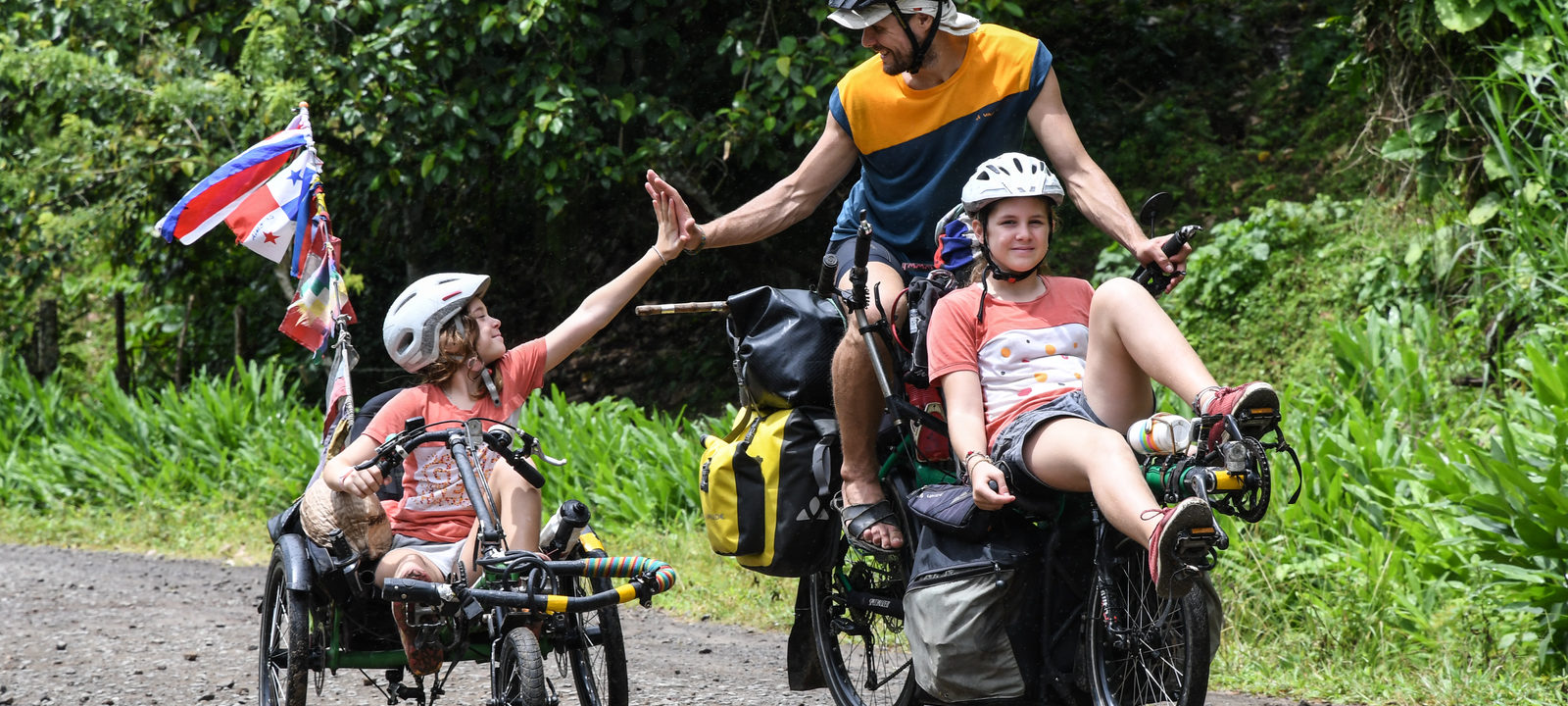
What happened so far:
The Happy Family keeps “Biocycling” Latin America. The force of a united family, much more than just a family outdoor adventure, discovering hidden stories of sustainable realities and organic farming.
Review: Part 2: Happy Family – BIOcycling: Adiós South America
If everything goes fine we’re hoping to do some video editing by the next month to do one.
Pura Vida Costa Rica
We’re in Costa Rica since the beginning of August 2019, around 23.500 km and almost 4 years cycling northwards from the tip of Patagonia. Since the beginning we felt that Costa Rica would have reserved us surprises for being considered the “greenest and happiest” country of the world. No army; generating 99 % of it’s electricity from renewable energy and it’s wonderful biodiversity were the points that attracted us most. Reaching Monteverde was rather adventurous, cycling uphill along backroads around the active perfect cone-shaped Arenal Volcano. Half way up the towbar connecting the tandem to the trailer broke, again.
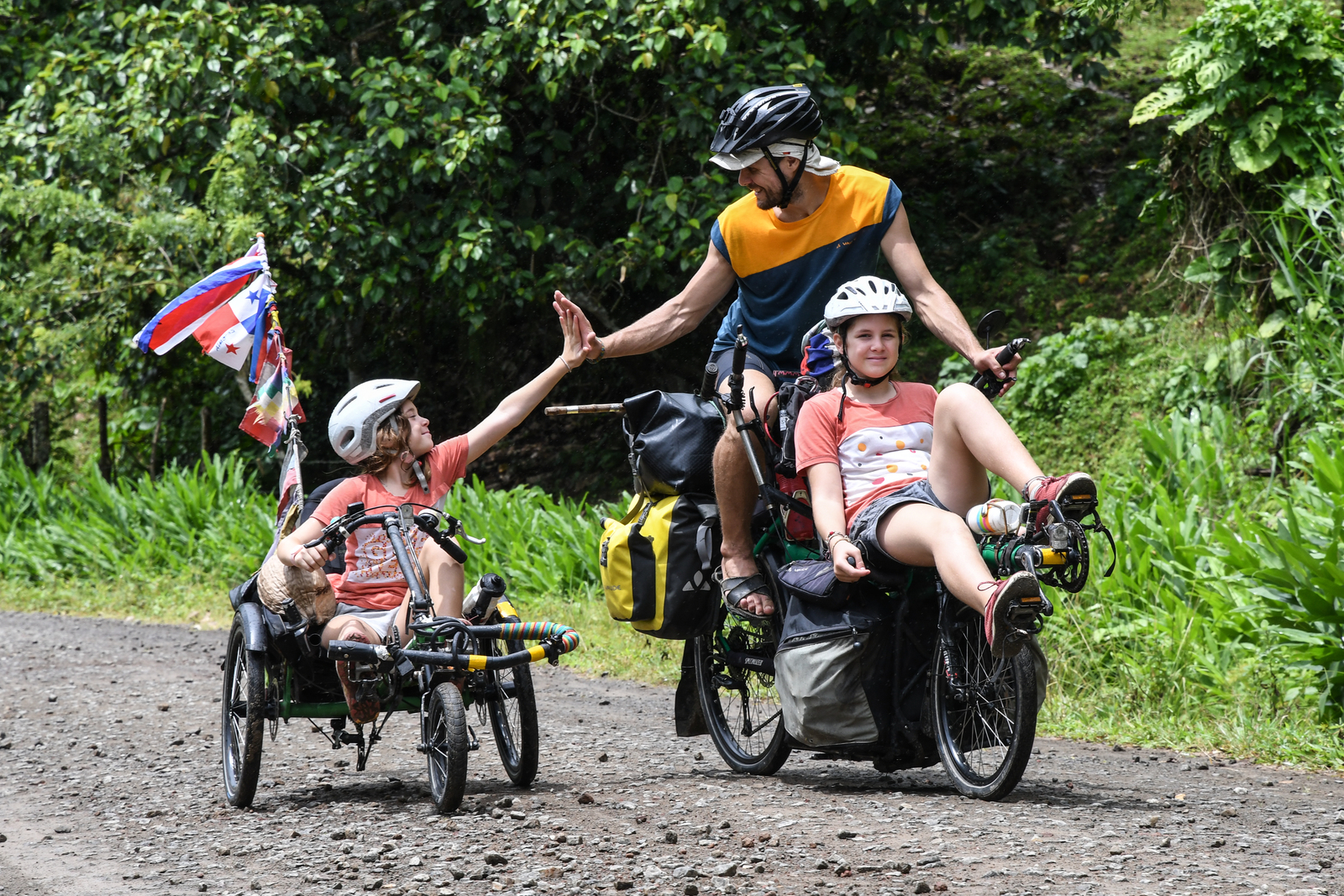
Fortunately the roads were safe and panoramic so,looking at the bright side, Anna finally got the opportunity to pedal alone for the first time in our journey. Pushing our bikes in turns slowly upwards like a team, and together with her sister having fun riding down like never before, we all felt so united and good.
Happily stuck
There were no specific plans or expectations for this place, but it seems we’re happily stuck until we get the new spare part from Hase Bikes Germany. Many wonderful people offered us support and love, since the day after our tough arrival, participating to an environmental event planting trees together, then at the “everyday for future” Climate Strike along the streets of Santa Elena. After spending our first week camping at “Café Life Monteverde, a sustainable coffee farm, where Life stands for Low Impact For Earth, some friends kindly borrowed us a free house to live in for the next month. Wow!
Home
Traveling for so long makes every place be home, adapting continlousily to whatever we find, if it’s our Mark XT tent, our sleeping pads layed down on the floor of any shelter or the house of people met suddenly on the road. Only 5 times in almost 4 years we had the chance to get a private place to live in for a while, having a proper kitchen, beds, hot water, internet and a washing machine. Simple things, seen from other points of view make such a big difference, that’s what we learnt along the way, you don’t need much to be happy.
Panama
It felt like we ran away from Panama after just a month an a half, a mixture of weird places and feelings, maybe for our tiredness and higher prices compared to South America. The Panamerican highway was a nightmare, for the noisy traffic, ups and downs and many punctures due to the steel pieces left from exploded truck tyres on the sides of the road where cyclists ride, a common issue to all bike travelers. Like in Ecuador we often hosted by many “Bomberos” (firefighter stations) that gave us a safe place to spend the night. So we skipped to the Caribbean coast for a few days of rest wild camping under coconut palms on the beach, filtering rainwater, charging batteries with solar panels and playing with the girls in the sea searching giant starfish. It seemed like a dream, but the lack of food and planned visits made us move on track again 4 days later.
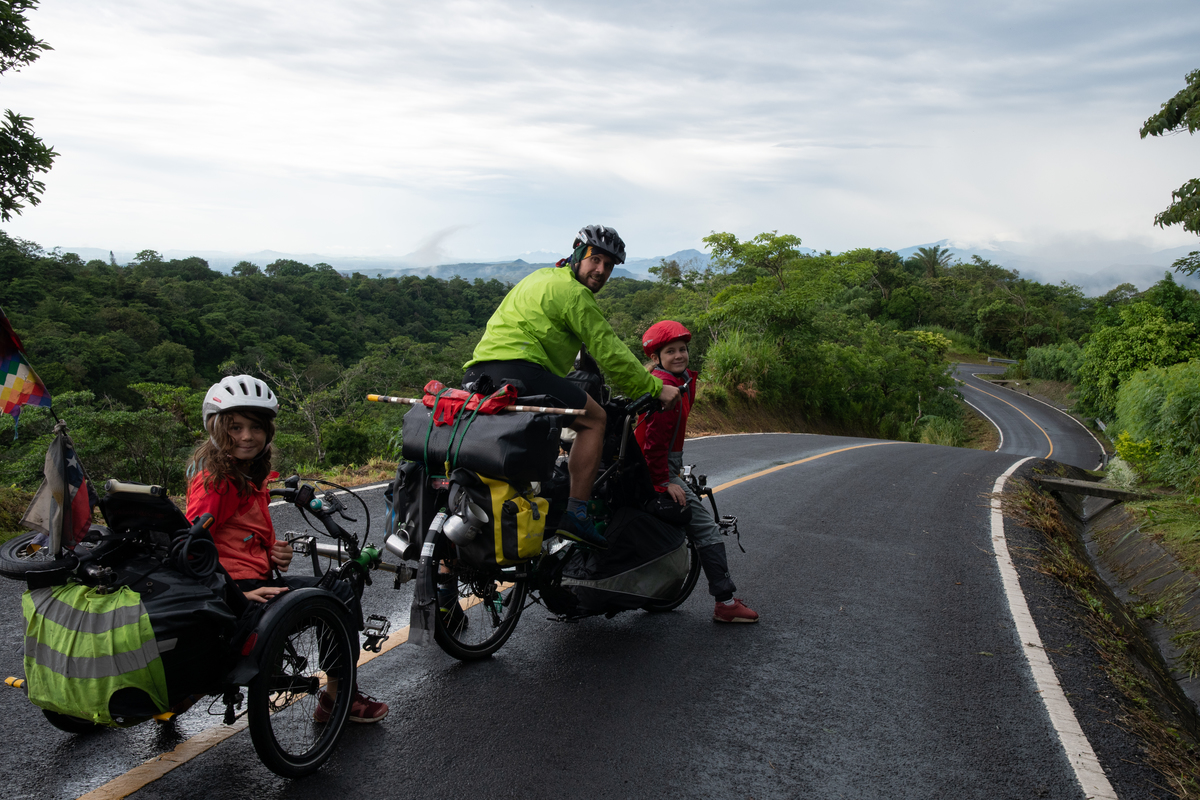
Bananas are the most popular fruit in the world, but at what cost? The impact of massive monoculture banana plantations of Chiquita was rather impressive, with aerial chemical spraying in a zone that originally would be a magnificent rainforest.
Indigenous communities
Discovering in a row other fair trade and organic farming realities, like: Cocabo, Coobana and Appta, mostly Ngobe, Naso and Bribri indigenous communities, put in touch thanks to Cooperativas Sin Fronteras, an organization of small producers that has followed our paths since Patagonia. After upstreaming the Yorkin River between Panama and Costa Rica on piraguas, we ended up settling a month and a half in a Bribri hut in the tropical rainforest, volonteering in their Stibrawpa community tourism project. Initially a bit frustrated for being disconnected not having electricity, internet, the humidity affected our computer, eReader and camera lens, cloths never got dry, etc…we realized that the best connection we had was with mother nature and theopportunity to understand from inside the bribris. Their historical and cultural ties with the land in which they live, protecting biodiversity, and their agroforestral banana and particularly native cacao which they call “Tsirù”, considered sacred.
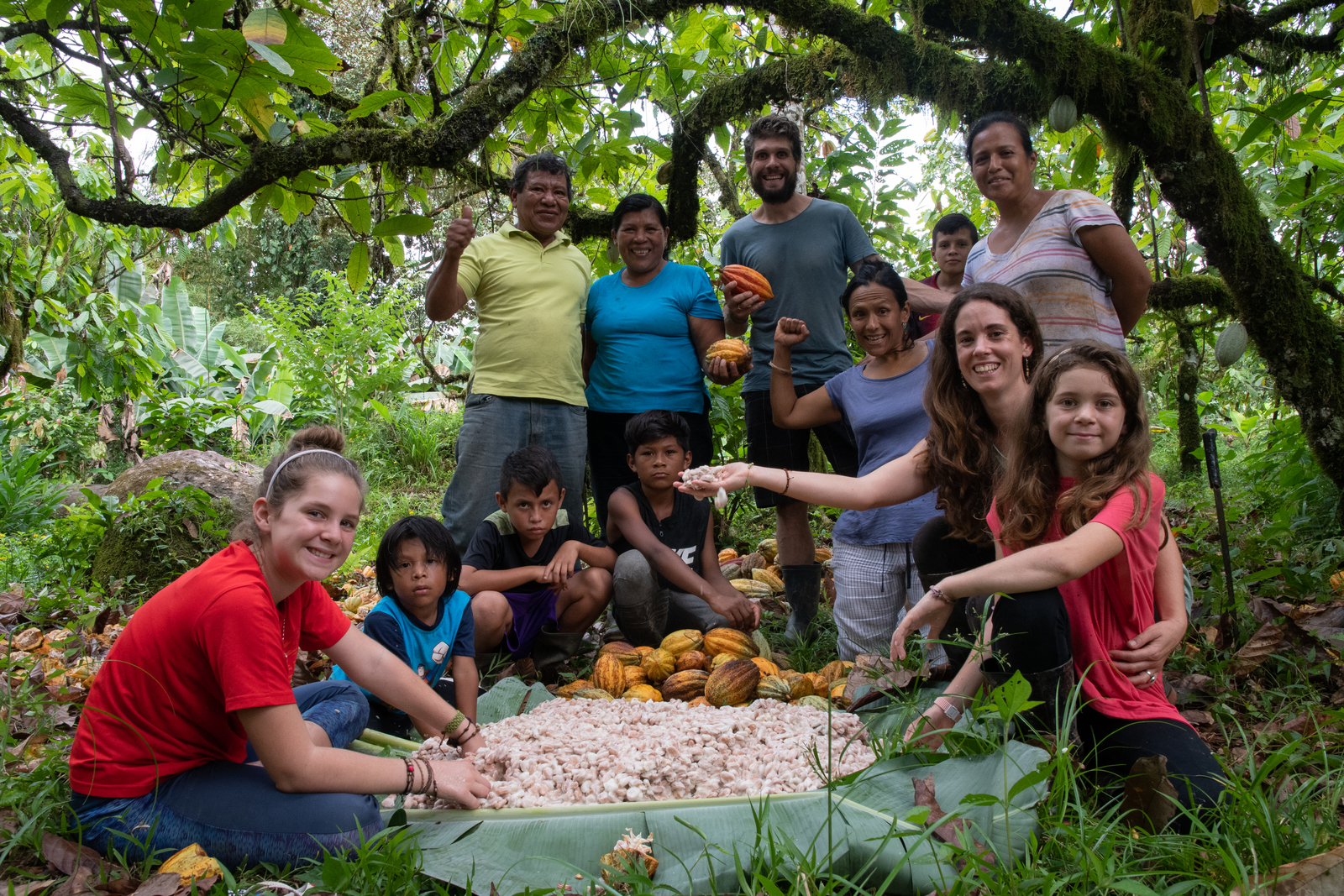
Once we went harvesting cocoa buds with Doña Dominga, a 76 year old woman still working hard, she told us: “these trees were planted by my father when he was young and they still feed my nephews, how couldn’t I take care of them?!”. Of corse we ate and drank a lot of hand made delicious chocolate and learnt the background magicof one of the most fascinating fruits on our planet. It was rather shocking getting to the concrete jungle of the Capital San Josè where we stopped 10 days busy in interviews on radios, TV and a conference organised at the Spanish Cooperation sharing our experience “building bridges & seeding values”. This is a little clip of how it went: Special Guest in San Josè
Next plan
By the end of October we’ll have to leave the country to Nicaragua, much more efordable compared to Costa Rica, probably stopping in Ometepe Island then reaching Prodecoop in Estelí, a cooperative of organic coffee farmers. There we’ll leave our bikes and take a transport back to Costa Rica, excited to meet our grandparents visiting us for Xmas.
It’s a good moment to take a break, as the weather is terrible outside, heavy rains everyday, hurricane season, so perfect to be comfortably indoors for a while catching up with Angela and Anna’s studies and leftover workings before hitting the road again.
Pura Vida to everyone!
As usual you can follow us on our social media as Happy Family Biocycling
– Facebook
– Instagram
– YouTube
And here you can spy our SPOT GPS by Gialdini Outdoor.
Text and Picture: Happy Family
Photo Gallery:


















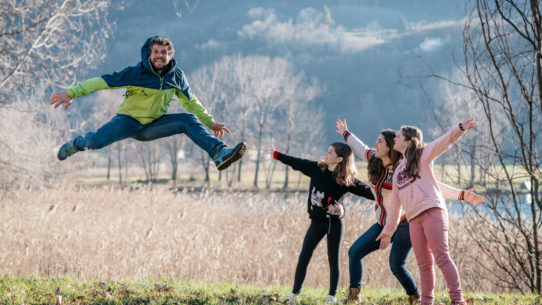
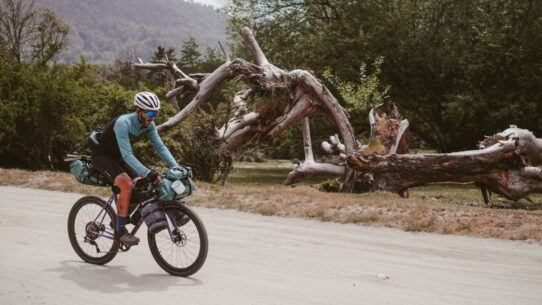
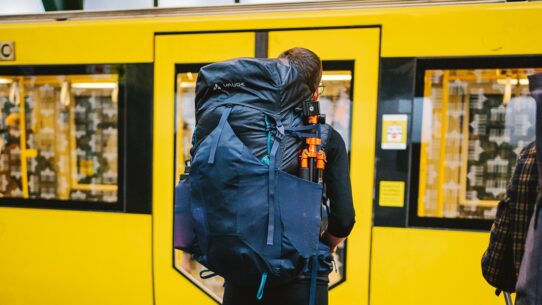
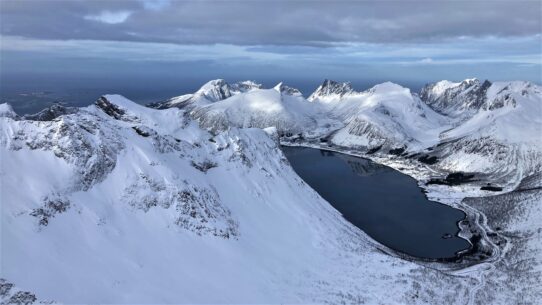
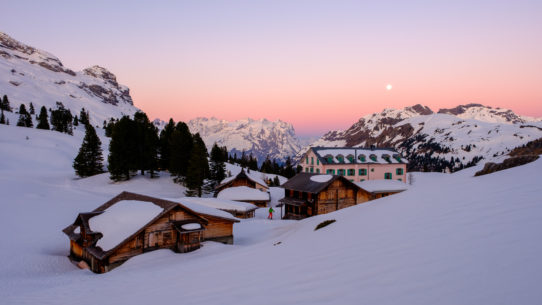
Comments